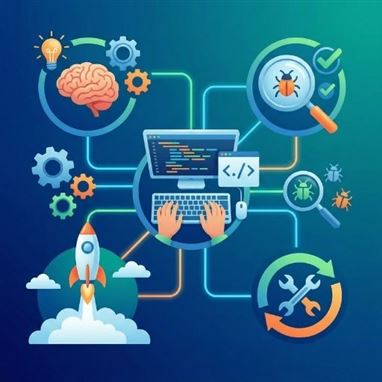What is Marketing? The Importance of Marketing in the Digital World
Marketing is the entirety of all strategic processes carried out to ensure that a product or service reaches the right audience, communicates its value, and encourages purchasing behavior. It is not only sales-oriented but also a versatile field that aims to increase brand awareness, build loyalty, and establish a sustainable relationship with the customer. Marketing is built on the foundations of research, analysis, communication, and persuasion.
With the acceleration of digitalization, the concept of marketing has undergone a significant transformation. Traditional methods have been replaced by digital tools, and the points of contact with consumers have multiplied. Today, the relationship a brand establishes with consumers through social media, search engines, email, or mobile applications has become the most critical factor directly affecting brand perception. Therefore, being active in digital is no longer an option but a necessity.
Thanks to digital marketing, it is possible to reach the target audience precisely, obtain measurable results with data analytics, and optimize campaigns instantly. While testing processes in traditional channels may take months, they can be managed within a few days in digital. This not only allows budgets to be used more efficiently but also enables marketing strategies to progress in a more flexible and results-oriented way.
Differences Between Traditional and Digital Marketing
The differences between traditional marketing and digital marketing clearly emerge in many areas, from communication channels to the ways of reaching the target audience. Traditional marketing establishes mass communication through one-way media such as television, radio, and newspapers, while digital marketing—with its interactive nature—enables one-to-one engagement with the user. At the same time, thanks to advantages such as measurement, targeting, and instant feedback in digital channels, marketing strategies are executed much more flexibly and in a data-driven manner.
Key differences between traditional and digital marketing:
- Traditional marketing is generally one-way; digital marketing offers two-way interaction
- Reaching the audience is more expensive in traditional; costs are lower in digital
- Digital marketing yields instantly measurable results, whereas the process is longer in traditional
- Digital marketing enables personalization; this is limited in traditional
- Targeting is broad in traditional channels, while very specific audiences can be defined in digital
- Digital marketing is richer in terms of content variety
- In traditional marketing, campaign returns are analyzed later
All these differences clarify which channels brands should use and for what purposes when creating strategies. While both methods have their own strengths, the flexibility, measurability, and goal-oriented nature of digital marketing provide a more effective response to today’s rapidly changing consumer behaviors. This clearly shows why digital has become so critical today.
Why Is Digital Marketing Indispensable Today?
Digital marketing is the fastest, most measurable, and most effective way to reach consumers in today’s communication age. In a world where almost all habits have shifted to digital, a brand’s visibility and ability to reach the right audience are made possible by digital tools. Through channels such as social media, search engines, email, and content platforms, consumer behaviors can be tracked and analyzed in real time, and strategies can be developed accordingly on the spot.
Core reasons that make digital marketing indispensable:
- You can reach the audience by location, interests, and behavior
- Campaigns can be measured and optimized instantly
- It is far more economical than traditional in terms of cost
- One-to-one and interactive communication can be established with users
- It enables multi-channel marketing strategies
- Brand awareness, conversion, and loyalty processes can be managed with ease
- Even small businesses can reach broad audiences
- Expertise and trust can be built through content creation
- It offers the ability to target mobile users
- Data-driven strategy development reduces risk
Digital marketing not only promotes products but is also a powerful tool for telling the brand story, creating value, and building a lasting bond with users. In such a comprehensive and fast-paced world, brands that stay away from digital channels risk losing both their visibility and competitive power over time. Therefore, digital marketing is not only today’s, but also the future’s core marketing approach.
What Are Digital Marketing Channels? (SEO, Social Media, Email, etc.)
Digital marketing channels consist of the various digital platforms brands use to reach their target audiences. Each channel serves different strategic purposes while offering advantages such as targeting, measurement, and personalization. Using the right channels together provides not only visibility, but also sustainable engagement and conversion success. Therefore, the function of each channel should be carefully evaluated within digital marketing strategies.
The main digital marketing channels are as follows:
- SEO (Search Engine Optimization): Optimizing content and technical structure to gain organic traffic
- Social Media Marketing: Increasing brand awareness and engagement on platforms like Facebook, Instagram, LinkedIn, and TikTok
- Email Marketing: Reaching potential and existing customers with regular content and campaigns
- SEM (Search Engine Advertising): Gaining visibility through paid ads on platforms like Google Ads
- Content Marketing: Delivering value to the target audience with blogs, videos, and infographics
- Affiliate Marketing: Generating sales and traffic through other publishers
- Influencer Marketing: Promoting based on trust through influential individuals
- Mobile Marketing: Communicating via mobile apps and SMS
- Video Marketing: Promoting the brand with visual storytelling on platforms like YouTube, Reels, and Shorts
- Web Push Notifications: Re-engaging visitors via browser notifications
These channels provide a strong foundation for brands to survive and grow in the digital world. Each creates a different touchpoint and contributes to the user journey. When it is correctly determined which channels will be used for which goals, digital marketing ceases to be merely a promotional tool and turns into the brand’s engine for sustainable growth.
Data-Driven Marketing and Measurable Success
Data-driven marketing focuses on building marketing strategies based on concrete data rather than intuition. Elements such as user behaviors, click-through rates, conversion data, purchasing habits, and demographic information determine how campaigns will be shaped. This approach enables measurable and repeatable success instead of relying on guesswork. Especially in digital channels, using data is indispensable for reaching the target audience with the right message at the right time.
Measurable success is considered one of the strongest aspects of marketing. The performance of each campaign can be analyzed, and to what extent goals are achieved can be clearly seen through KPIs. This allows brands to optimize return on investment (ROI). While the trial-and-error period is minimized, highly efficient campaigns take priority. A data-driven marketing culture makes not only the results but the entire marketing process smarter and more effective.
The Power of Digital Marketing for Small and Medium-Sized Businesses
For small and medium-sized businesses, the power of digital marketing lies in the opportunity to create a big impact with limited budgets. Large audiences that are difficult to reach with traditional methods can be targeted at a low cost through digital platforms. Moreover, since this process is entirely measurable, the efficiency obtained from each campaign can be clearly observed, and resources can be used in the most effective way. Digital marketing enables SMEs to compete on the same field as large brands.
In particular, channels such as social media, search engine advertising, content marketing, and email help SMEs make rapid progress in the branding process. The promotion of a product or service can reach thousands of people within seconds. Additionally, local targeting makes it easier to reach the right customer profile. Thanks to engagement-focused content, brand awareness increases in a short time, building a strong foundation for customer loyalty.
The flexibility offered by digital marketing makes decision-making processes more agile for SMEs. Campaigns can be revised instantly, and the most efficient tactics can be determined through performance analyses. This creates a competitive advantage while accelerating the growth journey. Unlike traditional marketing, every penny spent in digital can be tracked for its return, and the strategy is shaped accordingly. For SMEs, digital marketing means not only visibility but also sustainable success.
Frequently Asked Questions About Digital Marketing
1. What exactly does digital marketing do?
Digital marketing strengthens the brand’s online presence, enables it to reach the right people, and increases sales with measurable results.
2. Why should small businesses invest in digital marketing?
Because it’s possible to reach large audiences with a low budget. Tools like social media, SEO, and Google Ads allow effective access to local and niche markets.
3. Are SEO and digital marketing the same thing?
No, SEO is only a part of digital marketing. While it aims for visibility in search engines, digital marketing encompasses a much broader set of strategies.
4. How effective are social media ads?
Thanks to targeting options, you can reach exactly the audience you want. When supported with the right content, social media ads can drive conversions.
5. Which digital marketing channel is the most efficient?
It depends on the goal. Google ads are strong for e-commerce, while SEO and social media may be more effective for service sectors. Multi-channel use is generally recommended.
6. Does digital marketing deliver immediate results?
Some channels (like ads) deliver quick results, while processes like SEO take time. With proper planning, effective outcomes can be achieved in both the short and long term.
7. Why is content marketing so important?
Because it provides value to users, builds trust, and fuels SEO. Content such as blogs, videos, and guides increases brand authority and fosters loyalty.
8. Which is better: Google ads or social media ads?
Both work, but the purpose differs. Google reaches people with high purchase intent. Social media is ideal for awareness and engagement.
9. Does email marketing still work?
Absolutely. With proper segmentation and quality content, email campaigns remain one of the digital marketing methods with the highest ROI.
10. How is a digital marketing strategy created?
First, set the goal, then analyze the target audience. Next, plan which channels to use and with what content. Continuous measurement and optimization are essential.






Do Comment